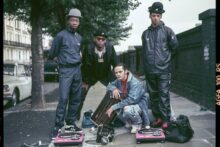They say good things come in threes. Although not formally broken up, Portishead gifted the world with their indelible trilogy of albums. And now with her third project, Portishead’s most recognisable component, totemic singer Beth Gibbons, has arrived with Lives Outgrown. It’s been 22 years since her first foray away from Portishead on the album Out Of Season, a collaboration with Rustin Man (Talk Talk’s Paul Webb). Six years after, we had Third, but since then the output has been sparse.
Lives Outgrown is her first proper solo project and in true Gibbons fashion, it’s not a quiet reintroduction. Nor does it come without some degree of involvement from another former Talk Talk member — this time it’s production by Lee Harris (with James Ellis Ford). The musical tie between Gibbons and Talk Talk has clearly become blood-bonded through time, going way back to when she applied to be in Webb and Harris’ band O’Rang — a possibility overtaken by Portishead’s catapult to fame with Dummy.
Gibbons, like a monk who repeatedly disappears and then reappears from sannyasa, is ready to give us the earthly understanding of our futility that we all need — her memento mori. Like the ferocious bitterness and dialled-up heat of Portishead’s second album, which countered Dummy’s icy, moonscape terrain, Lives Outgrown contains that same degree of emotional urgency. But it is less focused on the warped ways of the world and instead on the ways of the body and mind seen through the passage of time. It’s a hitherto unseen emotional cadence to Gibbons and it’s beguiling because it’s so personally revealing.
It points to hazy recollections of self, but like watching a car window slowly demist, clarity is gradually attained in your mind’s eye – when you take the time to ponder what you have lost and gained in becoming who you are today. ‘Burden Of Life’ is a heavy lamentation to that loss with a simple two-string acoustic bass line, met with a weeping violin underneath thunderous drums. Gibbons’ love affair with orchestral instrumentation continues on this record which notably includes many creative percussion styles. ‘Reaching Out’ and ‘Beyond The Sun’ bangs drums reminiscent of the ancient Japanese art of Taiko. There’s a particular atmosphere to this, a kind of marching drum to awaken us to our mortality; Gibbons’ call to action to herself.
Portishead, like their singer, has developed a reputation for purposeful divergence from expectation. Those, dare I say ‘trip hop’ sensibilities, a genre that many would credit Portishead with inventing, were eschewed on Third. Their distinct use of scratching and sampling were traded for electronica and various experimental forms while retaining their dripping-in-existential-noir stylings. Minus the trench coat-wearing agent lurking around the corner in each early Portishead song, of course (such was their influence from spy soundtracks).
This reemerged on tracks on her 2002 album with Rustin Man Out Of Season, where Gibbons solidified her penchant for reinvention, scaling Nick Drake-infused folk to jazz vocals à la Billie Holiday. Then some years later, her gregarious detour into opera on Henryk Górecki’s Third Symphony. As Górecki wrote for soprano, Gibbons’ voice strayed far from operatic discipline but her cobweb-fragile vocals melded into the majestic sadness of it all. Recently, you may have been reminded of another Gibbons work which was collaborating with Kendrick Lamar on ‘Mother I Sober’, a track that has cropped up in the ongoing beef between him and Drake.
So of course Gibbons surprises again on Lives Outgrown. But like her catalogue, it evokes a feeling of being in a new place yet sensing familiarity. On ‘Reaching Out’, a ghoulish operatic voice rises in and out, as memories of a previous life do. And then you’re hit with the bone-rattling impact of a brass band and melancholic strings on each ebb. It’s got the slight hue of a Shirley Bassey arrangement heard on ‘All Mine’. The brass band then turns Balkan on ‘Beyond The Sun’ with its galloping pace that demands you join the sonic ride into the Great Beyond. New to Gibbons is this wider world sound littered across the album. On ‘For Sale’, strings mimic the devastating sadness of a sarangi while Gibbons asks desperately, “If we don’t stop now / Will we go too far?”
The album title is a fitting double entendre to reflect contemplation of the past as well as the inevitable confrontation with a weakening body, or outgrowing of life, articulated in ‘Floating On A Moment’. It opens with a pensive guitar riff accompanied by overlapping breathing. Her voice contains that same intimacy we heard on Out Of Season’s ‘Mysteries’, one of very few Gibbons tracks about the joys of life. Except here, her vocals carry sorrow, “Travelling on a voyage where the living, they have never been / Have never seen”. There is a hint of Bowie’s Blackstar about this album but if that’s too morbid, then Pink Floyd’s song ‘Time’ contains the same grappling of mortality.
Suited to Portishead’s umbral beats, Gibbons is likewise elusive in public. My discovery of an interview she gave with French TV show Taratata in 1995 is pure gold dust — useless gold dust because she barely says anything. So it’s a welcome rarity to have Gibbons offer a few words on this record, “Before, I had the ability to change my future, but when you’re up against your body, you can’t make it do something it doesn’t want to do.” On ‘Rewind’, rhythmic North African-influenced drumming is met with discordant screeching guitars that end on a bittersweet sample of children splashing about in a pool. It’s a reminder of a body pitted against time, the fraught transition through menopause — such an explicit end to something you have lived with (and sometimes loathed) for a long time, yet the beginning of a new chapter.
Where Out Of Season was autumnal in shading, Lives Outgrown is coloured in the stormy blacks and blues of winter, with a sudden glimpse of spring on its final track, ‘Whispering Love’. Almost halfway, a lilting violin strikes up like a little birdie saying hello, or goodbye. After Gibbons pays homage to trees of life and wisdom, we end with chickens clucking, birds tweeting, leaves rustling – sounds that evoke her childhood on a farm in Devon.
Lives Outgrown isn’t a rally against the world, an expression of a gnawing emptiness or a deep dive into desire. These are songs from a Beth Gibbons who is confident to present her innermost journey, to galvanise her many years of craft, and to arrive at a place that is honest in feeling yet accepting of our impermanence.






